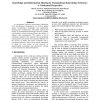Free Online Productivity Tools
i2Speak
i2Symbol
i2OCR
iTex2Img
iWeb2Print
iWeb2Shot
i2Type
iPdf2Split
iPdf2Merge
i2Bopomofo
i2Arabic
i2Style
i2Image
i2PDF
iLatex2Rtf
Sci2ools
HICSS
2011
IEEE
2011
IEEE
Knowledge and Information Sharing in Transnational Knowledge Networks: A Contextual Perspective
As government agencies increasingly collaborate with international counterparts on critical global issues, transnational knowledge and information sharing grow in importance. This paper explores the nature of Transnational Knowledge Networks (TKNs) and identifies critical contextual factors that hinder or enhance their performance. We explore a set of contextual distances that separate the participating organizations and discuss their potential influence on the success of TKNs. The paper concludes with a conceptual framework and a set of testable hypotheses to guide the next phase of our research in understanding knowledge and information sharing across national and cultural boundaries.
Biometrics | Critical Global Issues | HICSS 2011 | Transnational Knowledge | Transnational Knowledge Networks |
| Added | 20 Aug 2011 |
| Updated | 20 Aug 2011 |
| Type | Journal |
| Year | 2011 |
| Where | HICSS |
| Authors | Sharon S. Dawes, Mohammed A. Gharawi, G. Brian Burke |
Comments (0)

